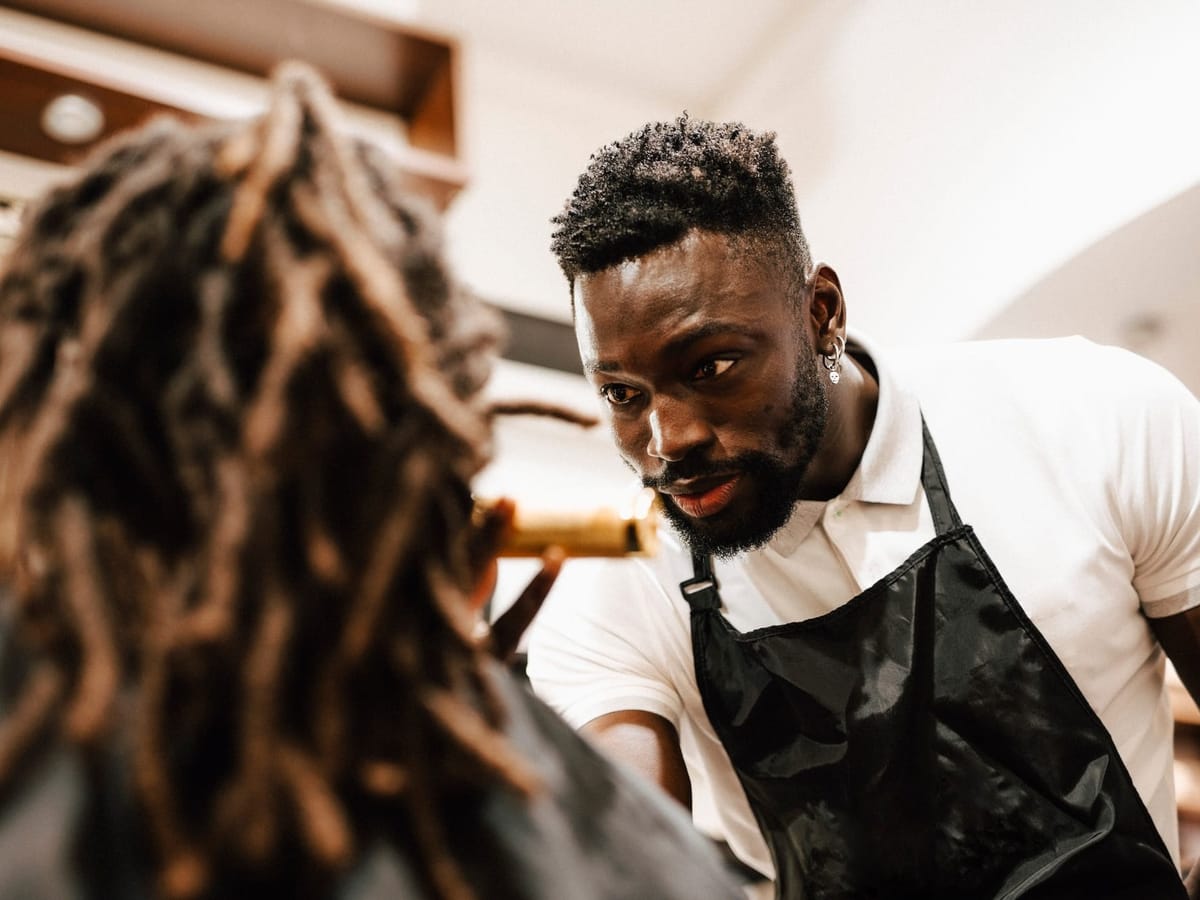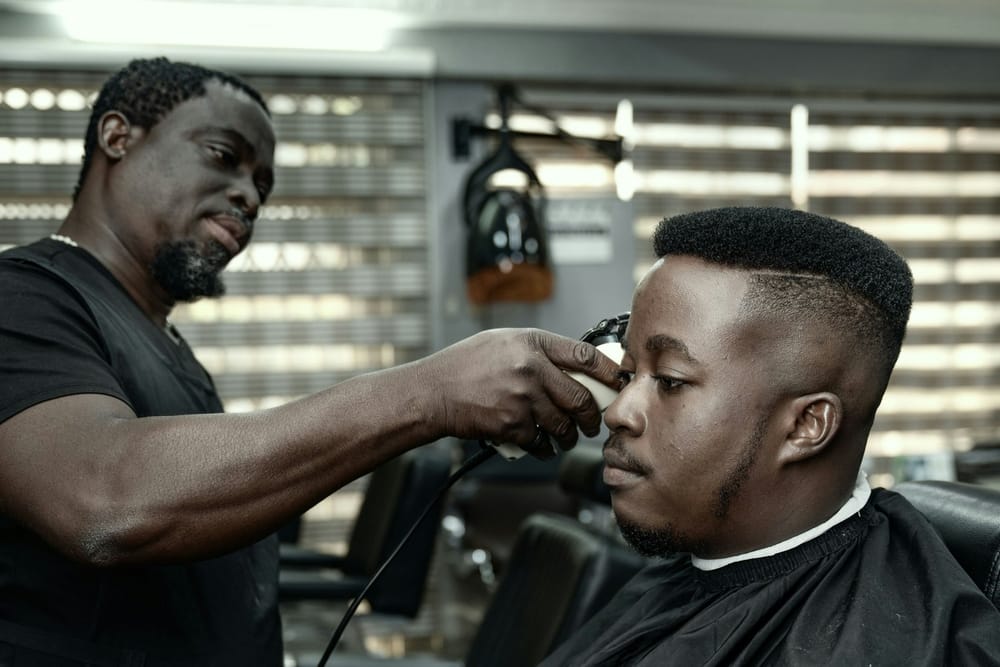One of the major differences between Africa and the West is the perception we have of family. In Africa, and especially in Cameroon where I grew up, the family extends to distant cousins and even longtime neighbors. And more often than not, everyone around us is considered family. In the West, there is a bit of that in big cities where, more often in marginalized communities like LGBTQ+, family is usually the people who accept one as they are.
Extended family meant that during my childhood in Fanta Citron, Mvog-Ada in Yaoundé in Cameroon, we children showed respect to the adults in the neighborhood without exception. We called men “Papa” and women “Mama” followed by their last or first names. It was rare to see a child disobey when they were asked to do something by an adult in the neighborhood. Had you come in the neighborhood for a day, you would not be able to tell who were the real parents of the kids you would have encountered, as we treated all adults as our parents.
“Sister, she’s possessed, I tell you,” I heard my mother say to Auntie Blandine one afternoon, when I had just come home from school, which was more than a hill away from the house. I was tired from the walk but I had learned that when my mother and Auntie Blandine were whispering, it meant that something unusual had happened. So, I forced myself to stay awake.
“What’s gotten into her, sister?” said Auntie Blandine. It was her favorite expression when she was at a loss for words or overwhelmed by events.
“I tell you she’s possessed, sister," mom continued. "The devil is inside her. I changed her. I bathed her, and this is my reward? Being insulted by a kid? She’s possessed.”
“Sister, she is lost,” added Auntie Blandine, while making the sign of the cross.
The die was cast.
I discovered a little later that they were talking about cousin Mbala, about whom a family council had just been convened. Cousin Mbala had committed an unforgivable crime according to the adults, and especially in view of our traditions: she had a fight with one of our “mamas” from the neighborhood. The latter had come between cousin Mbala and a group of girls with whom she was arguing. Cousin Mbala had then attacked mama Crescence, the neighbor. It was a public argument where the two threw insults of all kinds at each other. It was an unforgettable scene for many in the neighborhood who had witnessed it.
Cousin Mbala was older than me. At the time she was 16. It took the intervention of Auntie Anata so that Cousin Mbala and Mama Crescence would not get physical. But cousin Mbala did not stop there. She began to insult Auntie Anata, the wife of uncle Mvondo. Taken by surprise, Auntie Anata slapped her. Cousin Mbala slapped her back. Under the shock, Auntie Anata threw herself on her. Cousin Mbala did not let herself be defeated. A crowd formed around them as they tumbled around on the ground. The crowd continued to grow, torn between excitement and shock. Not only was cousin Mbala considered a “child” but she was also fighting her biological aunt. It was uncle Amougou, the last of my mother’s five brothers, who managed to separate them. They had claw marks on their faces. Blood was flowing. Auntie Anata was beside herself. Cousin Mbala kept saying that she was going to show the “oldie” who was the strongest. To say that it was a humiliation for the family and a big setback for our traditions would be an understatement.
Why had Cousin Mbala gone rogue? No one asked. What obsessed my mother and her siblings was making sure that none of us followed Mbala’s example. That was the purpose of the family meeting that ended with one recommendation: they had to tighten the leash around our necks. Basically, they were going to be more authoritarian. Was it the lack of discipline that had caused cousin Mbala to lose control and become disobedient? They were not really interested in why it happened. In our tribe where having children was essential, the child was paradoxically never at the center.
It was this pivotal moment that upset one of the balances in my neighborhood, my family and my mother’s tribe that I thought about in recent days while listening to my brothers reject the blame game in which the liberals have been indulging, since Donald Trump’s victory over Kamala Harris in the presidential election of November 5. It is true that the President-elect has benefited from greater support, than the polls predicted, from minorities and more particularly from minority men.

Since then, my bros have been called “gullible”, “uninformed” and “stupid”. When they reveal that they voted for Trump or that Harris should have seen it coming, they are told by liberals that they will soon find out that Trump is not good for them and that they have basically voted against their own interests.
Liberals have sarcastically been wishing my bros good luck with the new presidency. It is a way of reminding them that they have done something wrong. As if, as my barber told me recently, they had committed the worst of sins. And that their punishment will be unforgettable.
In fact, most of the comments on the stories I have written since the election have been similar. “Enjoy finding out that Trump is not your bro when he comes for your safety net and everything else you take for granted,” one reader commented.
Black men used their right to vote and made their choice. The fact that this choice does not please some is expected. The strength of democracy is the pluralism of opinions. It is from this pluralism that it draws its strength and dynamism. By throwing in their faces that they made the wrong choice or that the right choice for them was Kamala Harris is not only condescending but is also denying them the right to decide for themselves. It is treating them like sheep, who must follow the orders that come from above.
“They say they want to save democracy,” one of my bros told me last week, referring to liberals. “But at the same time, they dismiss our votes. Isn’t it democracy to have people vote and exercise their will without being judged for it?
“The ‘Blue’ like democracy when they win,” he continued. “If it doesn’t go their way, then it’s Armageddon. How is this different from Trump’s MAGA?”
The difference is January 6, I told him. Liberals are not going to use violence to try to overthrow the government because the outcome of an election did not go their way.
He agreed, but argued that by taking their disappointment and anger out on people who think differently amounts to them losing the moral high ground they claimed to have over Trump and the MAGA movement.
“I voted for Trump. I ain’t sorry,” another bro told me. “Why do they act like we should apologize?”
For many liberals, minority men and especially young men went rogue on November 5. I understand that. But instead of screaming at them or acting as if they are owed an apology, like some of my bros put it, shouldn’t they ask themselves how is it that some minority voters supported someone known to make controversial and racist statements?
Like my family decades ago, which did not try to understand why cousin Mbala broke centuries of tradition, liberals are focusing on the wrong point. It is not about how they came to vote for a convicted felon but why. What did the liberals miss?
Here is how to change the conversation: get rid of the insults, the blame game and the sarcasm. As a reader said in a comment, ”I do think it’s important to understand what they are thinking and have empathy for it. We have to listen to understand. We have to understand to resolve a situation.”
This reader is right.
Listening is what Kamala Harris and many progressives have failed to do. The messages from many minority men were clear: the economic and societal changes have made them feel lost in a world in which they have less and less power. They are disenfranchised and disempowered. Some believe that only a strong gesture, like voting for someone whose behavior they abhorred, was the way to make themselves heard.
On October 7, I published a piece “What’s in It for Us?: My Black Bros Ask Democrats.” I wrote that Democrats have to stop thinking that Black people, and in some way Brown people, are going to continue to support them. Things have changed. Minority voters want to be treated like White voters, meaning being listened to and not just courted when comes election time. Democrats must work hard to win their votes because they have different aspirations and demands. Playing on just racism and liberty will not cut it going forward. It is important to understand that the expectations of the Black and Brown working class are different from the Black and Brown middle class. I found out during my trip, a couple of months ago, in swing states with large Black populations, that the Black working class and the wealthy Black folks align in their way of voting, whereas the Black middle class is the one that remains loyal to the Democrats.
“The Democrats, unless they make a sudden leap to tailor their policies towards Black people, risk losing a part of a voting bloc that has been loyal for decades. This is not something new,” I wrote back then. “In the last eight years, they lost a huge part of the working class to Trump and the Republicans.”
I also wrote: “After 2024, the Republicans will really have a chance to compete for the votes of Black men. Black men are willing to listen to all sides. In the end, they will take the best offer.”
A few weeks later, my assessment still stands.
In the same way that my family lost cousin Mbala and the following generations — today the adults have lost a large part of the respect they enjoyed for centuries in several tribes in Cameroon — if the progressives limit themselves to blaming and waiting for my bros and others to apologize for not having voted for Kamala Harris on November 5, they run the risk of permanently losing a significant part of their loyal constituencies.
When things do not turn out as you expected, introspection is necessary to understand what really happened and how to fix it. Deflecting responsibility and blaming others for your mistakes leads nowhere. When there is a fire in a house, you do not put it out by throwing oil at it.
This post originally appeared on Medium and is edited and republished with author's permission. Read more of Jeffrey Kass' work Medium.

